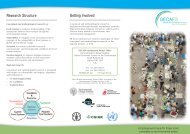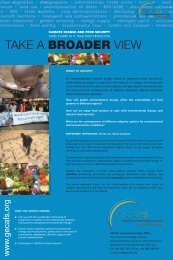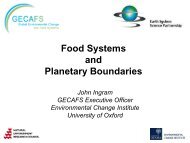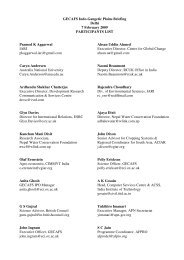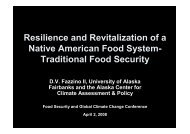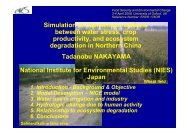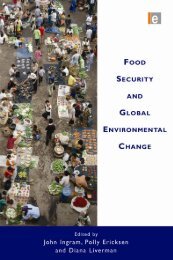water) are used, and reduce negative externalities such as soil degradation, water pollution,loss of biodiversity and greenhouse gas emissions (van Ittersum and Rabbinge, 1997;Gregory et al., 2002).Meanwhile, as the climate change agenda has gathered momentum, research on the impactson food production has rapidly increased. It is now clear that climate change will affect cropgrowth in many parts of the world, with the most deleterious impacts anticipated in thedeveloping world (Parry et al., 2004; Parry et al., 2005; Foresight, 2011). Changes in averagetemperatures, and in rainfall amounts and patterns will have positive and negative effects onyields and/or change production costs, depending on location, but increases in weatherextremes are particularly worrying: an increase in double droughts or prolonged elevatedtemperature at critical stages of crop growth will be locally devastating and of major concernif widespread. Lives<strong>to</strong>ck and fisheries will be affected both directly through heat stress andindirectly through impacts on grazing and other feed s<strong>to</strong>cks. Climate change will also haveindirect impacts on food production through alterations <strong>to</strong> pests and diseases, and on demandsfor water. Negative impacts on crops will only be marginally offset by the fertilisation effectsof elevated CO 2 , with perhaps a 8-12% gain for a double pre-industrial CO 2 concentration(Gregory et al., 1999); but a world with such elevated CO 2 would experience such massiveclimate change that all efforts must be made <strong>to</strong> avoid this.While agricultural research is moving <strong>to</strong>wards addressing the twin goals of producing morefood while simultaneously reducing negative environmental feedbacks (or even increasingpositive environmental feedbacks e.g. though carbon sequestration), a major motive for mostsuch research remains the need <strong>to</strong> increase food production yet further. This research efforthas gained impetus from the increasing realisation of the (mainly) detrimental impacts thatclimate change and other aspects of global environmental change (GEC; e.g. changes inwater resources, biodiversity, tropospheric ozone, sea level) will have on food production,most notably in the developing world. This is based on a greatly increased understanding ofhow GEC will affect food productivity (yield) at field level.Emergence of more integrated food security researchThe continuing research emphasis on producing food is not surprising given its longestablishedmomentum and on-going investment, and the undeniable need of having <strong>to</strong>produce more food in the years ahead. But, despite the fact the world currently producesenough food for all, the number of food-insecure people world-wide currently attests that ourunderstanding and approaches are insufficient. New concepts, <strong>to</strong>ols and approaches areclearly needed <strong>to</strong> address the broader food security agenda. Their development is all the moreurgent given the additional complications that GEC is already bringing <strong>to</strong> the many for whomfood security is already far from easy. Yields are now seen <strong>to</strong> be deleteriously affected byrising temperatures (Lobell et al., 2011); increases in the frequency of floods and droughts(although hard <strong>to</strong> attribute <strong>to</strong> climate change per se, but which are widely anticipated in4
future climate scenarios) disrupt food s<strong>to</strong>rage and distribution systems (as vividly seen inPakistan in 2010), and contribute <strong>to</strong> raising food prices on the international markets (as seenfollowing the Australian drought also in 2010).So how has research aimed at encompassing a broader food security agenda developed?The economics and social science research communities have been addressing the broaderperspectives on food security for several decades. Socioeconomic aspects have been animportant component of farming systems research since the early 1970s, and Duckham andMasefield (1970) noted that the relevance of research and technology <strong>to</strong> any farming systemcan only be assessed with a knowledge of both the ecological and economic fac<strong>to</strong>rs operatingon that system. Since the World <strong>Food</strong> Conference in 1974 researchers have been interested inlivelihoods at household and individual levels, an important determinant of food securitygiven the need of many <strong>to</strong> buy food (Maxwell, 1996), while more recent work has studied therole of food prices (e.g. Johns<strong>to</strong>n, 1984; FAO, 2009a) and institutions (e.g. Maxwell, 1995;Karanja, 1996).These developments were however largely uncoupled from research by the biophysicalcommunity but, given the multiple dimensions of food security, the need for interdisciplinary,even trans-disciplinary, approaches is now well accepted (Liverman and Kapadia, 2010; UK<strong>Global</strong> <strong>Food</strong> <strong>Security</strong> Programme, 2011). Indeed, food security research is in fact a very goodexample of the need for much enhanced interdisciplinarity, with social science, economicsand the humanities all playing critical roles in addition <strong>to</strong> the biophysical sciences (Pálsson etal., 2011), and accepting this acknowledges contributions of many different disciplines.Early work by the GEC research community on food security recognised the need <strong>to</strong> thinkbroadly (as distinct <strong>to</strong> limiting work on crop productivity), and initially addressed the notionof ‘food provision’ (Ingram and Brklacich, 2002; Ingram and Brklacich, 2006: Paper 1). Thiswork embraced the important notion that food provision 1 is governed by both the availabilityof, and access <strong>to</strong>, food. Access <strong>to</strong> food was noted as a function of economic potential,physiological potential (e.g. nutritional quality) and food availability. <strong>Food</strong> availabilitydepends on production and distribution, with food production being a function of yield perunit area and the area harvested.Yield per unit area (or productivity) is a function of genetic potential (G), environment (E)and management (M). This approach is particularly useful in stressed environments (Spiertzand Ewert, 2009) and it is hence the “E” component which has attracted the considerableinterest of GEC researchers given that GEC is usually associated with increased biophysicalstress. (It is worth noting that the bulk of the GEC ‘food’ literature addresses crops, andhence the notion of crop yield, hectares under cropping, etc. dominates; lives<strong>to</strong>ck andfisheries have some prominence, ‘wild food’ hardly any.)1 The term ‘food provision’ was later dropped in favour of ‘food security’ so as <strong>to</strong> move away from the notion ofproviding food and <strong>to</strong>wards the notion of access <strong>to</strong> food encapsulated in the FAO 1996 definition.5
- Page 1 and 2: From Food Production to Food Securi
- Page 3 and 4: From Food Production to Food Securi
- Page 5 and 6: Table of ContentsAbstract .........
- Page 7 and 8: Paper 6: Undertaking Research at th
- Page 9: AbstractFood security is a conditio
- Page 12 and 13: 2010 about 925 million people had t
- Page 16 and 17: While the flow of the argument abou
- Page 18 and 19: determine interactions along and be
- Page 20 and 21: Paper 3: A Food Systems Approach to
- Page 23: From Food Production to Food Securi
- Page 26 and 27: concerns and are now issues that mu
- Page 28 and 29: the relationships between GEC and f
- Page 30 and 31: Theme 2 aims to understand how comm
- Page 32 and 33: GEC and the Food System of the Indo
- Page 34 and 35: Paper 2: The role of agronomic rese
- Page 36 and 37: These advances have resulted from a
- Page 38 and 39: Crop selection to determine mechani
- Page 40 and 41: Agronomic science is central to imp
- Page 42 and 43: Agronomic research in relation to f
- Page 44 and 45: The discussion above identifies a n
- Page 46 and 47: interventions and political inertia
- Page 48 and 49: While research on producing food ha
- Page 50 and 51: Box 1 Food system Activities and fo
- Page 52 and 53: In addition to broadening the debat
- Page 54 and 55: options. Examples already seen rang
- Page 56 and 57: Figure 3 Outcomes for 10 variables
- Page 58 and 59: Figure 4 Nine ‘planetary boundari
- Page 60 and 61: Figure 5 Environmental change, food
- Page 62 and 63: Table 1: Indicative analysis of the
- Page 65:
From Food Production to Food Securi
- Page 68 and 69:
Trade Agreement (NAFTA) and the Eur
- Page 70 and 71:
Parry et al., 2005). Conducting foo
- Page 72 and 73:
is provided in the ESF/COST Forward
- Page 74 and 75:
Paper 5: Engaging Stakeholders at t
- Page 76 and 77:
into actions (strategies, policies,
- Page 78 and 79:
Box 2 Engaging with stakeholders in
- Page 80 and 81:
Box 3 Setting the research agenda f
- Page 82 and 83:
Third, and of considerable practica
- Page 84 and 85:
Figure 2: Organizing and understand
- Page 86 and 87:
organizations made up of numerous n
- Page 88 and 89:
Elements of good practice in stakeh
- Page 90 and 91:
Finally, it is worth noting that fo
- Page 92 and 93:
development (Lee, 1999; Gunderson a
- Page 94 and 95:
Box 7 The GECAFS stakeholder survey
- Page 96 and 97:
‘break down’ what might be a hi
- Page 98 and 99:
Paper 6: Undertaking Research at th
- Page 100 and 101:
agriculture in many parts of the wo
- Page 102 and 103:
gaps. The presence of a strong tech
- Page 104 and 105:
an average of two years to coalesce
- Page 106 and 107:
Institute for Meteorology and Hydro
- Page 108 and 109:
Identifying case study sitesResearc
- Page 110 and 111:
can both benefit from and contribut
- Page 112 and 113:
Box 5 Mapping stakeholder interests
- Page 114 and 115:
Holding planning meetings in locati
- Page 116 and 117:
This reorientation of the debate fr
- Page 118 and 119:
Importance of this type of research
- Page 120 and 121:
Integrating the food system concept
- Page 122 and 123:
awareness of the GEC issues within
- Page 124 and 125:
pollutants were then introduced as
- Page 126 and 127:
communities operating in food syste
- Page 128 and 129:
Improving input-use efficiency acro
- Page 130 and 131:
governance focuses on the range of
- Page 132 and 133:
Developing research agendas in supp
- Page 134 and 135:
The renewed approach to interdiscip
- Page 136 and 137:
BIELAK, A., HOLMES, J., SAVGÅRD, J
- Page 138 and 139:
EAKIN, H. 2010. What is Vulnerable?
- Page 140 and 141:
GODFRAY, H. C. J., BEDDINGTON, J. R
- Page 142 and 143:
INGRAM, J. S. I. & FERNANDES, E. C.
- Page 144 and 145:
LYUTSE, S. 2010. The One Billion To
- Page 146 and 147:
RAYNER, S. & MALONE, E. L. 1998. Hu
- Page 148 and 149:
UNDP 2006. The 2006 Human Developme
- Page 150 and 151:
activities “from plough to plate
- Page 152 and 153:
contribution to the science agenda:
- Page 154 and 155:
urgently needed, and - given the gr
- Page 156 and 157:
GECAFS plannenmakerij stelde vast d
- Page 158 and 159:
ieder hun eigen groep van betrokken
- Page 160 and 161:
het gebied van beheer hebben betrek
- Page 162:
Curriculum VitaeFollowing a BSc in



